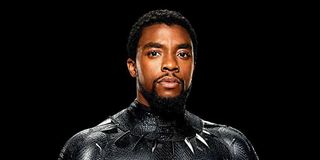Black Panther and negative stereotypes of black people

Chadwick Boseman, the star of the movie 'Black Panther.' Mr Boseman died on august 28, 2020.
What you need to know:
- In Black Panther, Boseman sets out to change the negative stereotypes of black people.
This fear of exploitation is probably the reason that Wakanda conceals its mineral wealth from the rest of the world.
“In certain latitudes there comes a span of time approaching and following the summer solstice, some weeks in all, when the twilights turn long and blue… You notice it first as April ends and May begins, a change in the season, not exactly a warming — in fact not at all a warming — yet suddenly summer seems near, a possibility, even a promise. You pass a window… you find yourself swimming in the colour blue: the actual light is blue, and over the course of an hour or so this blue deepens, becomes more intense even as it darkens and fades.... The French called this time of day “l’heure bleue.”
To the English it was “the gloaming.” The very word “gloaming” reverberates, echoes — the gloaming, the glimmer, the glitter, the glisten, the glamour — carrying in its consonants the images of houses shuttering, gardens darkening, grass-lined rivers slipping through the shadows. During the blue nights you think the end of day will never come.
Dying of the brightness
As the blue nights draw to a close (and they will, and they do) you experience an actual chill, an apprehension of illness, at the moment you first notice: the blue light is going, the days are already shortening, the summer is gone… “Blue Nights” because at the time I began (writing) I found my mind turning increasingly to illness, to the end of promise, the dwindling of the days, the inevitability of the fading, the dying of the brightness.”
These words from the book Blue Nights, by Joan Didion — a shattering memoir on motherhood, ageing, illness and death — have been ringing in my mind as I went from home to hospital to morgue after losing my sister-in-law, Philistine Nyambura. The end, when it came for her, was swift and brutal when she died on Sunday, August 30.
Two days earlier, far away, Chadwick Boseman, the runaway star of the movie, Black Panther, had also died. The death of Boseman was a serious blow to the redemptive counter-mythological movie, Black Panther. Boseman was the lead actor, probably the most celebrated black superhero.
In most movies from Hollywood, black characters are stereotypical: Dead beat fathers. Fathers incarcerated in maximum prisons. Mothers addicted to heroin and children in foster care.
However, there is still something wrong with this narrative – that black people are incapable of doing well in life.
Black person
Boseman was proud of his identity as a black person on set, in real life (as revealed in several interviews) and even in posters. Writing in the New York Times, Adrian Matejka says that, “On the marquee at the theater across the street: a poster for Black Panther with Chadwick Boseman’s unmasked face looking down, clawed gloves curled inward toward him. In the unrepentant shadows it’s hard to tell if he’s studying or mediating, but it’s still a beatitude of Blackness: colour as signifier, colour as artifact, colour as stone cold fact”.
In Black Panther, Boseman sets out to change the negative stereotypes of black people.
Boseman plays the character T’Challa or Black Panther, the king of the fictional African nation of Wakanda — a country that is rich in mineral resources but hides them from the rest of the world.
This fear of exploitation is probably the reason that Wakanda conceals its mineral wealth from the rest of the world.
Wakanda is a country of unvanquished and proud Africans, untouched by modern decay. As Adam Serwer (of The Atlantic) aptly described it, “Black Panther is a love letter to people of African descent all over the world. Its actors, its costume design, its music, and countless other facets of the film are drawn from all over the continent and its diaspora, in a science-fiction celebration of the imaginary country of Wakanda, a high-tech utopia that is a fictive manifestation of African potential unfettered by slavery and colonialism”.





